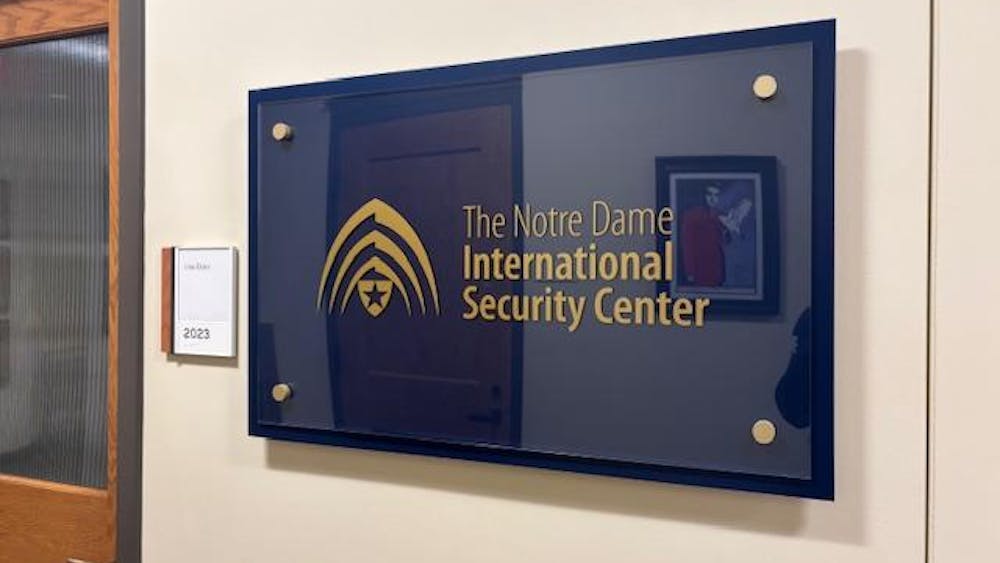The Student Policy Network (SPN), a project of BridgeND that pursues student/firm partnerships in public policy, has launched three projects for the fall semester.
Juniors Greg Miller and Patrick Aimone said they initiated the launch of SPN after identifying a gap in the opportunities for students to learn more about careers in public policy at Notre Dame. SPN provides undergraduate students with opportunities to pursue policy research and advocacy with partners.
Both Miller and Aimone said they designed SPN to be structured similarly to the Student International Business Council (SIBC).
“Notre Dame does a great job connecting and placing students who have even just a passing interest in consulting and finance in those worlds,” Aimone said. “I think part of it is the existence of these student organizations that make it really easy to take a first stab at figuring out if it's something you enjoy doing.”
Aimone said the goal of SPN is to provide an opportunity for students to get a feel for a career without committing to a full-time summer internship, while also gaining real experience on projects.
“There are a lot of students who have a minor that’s associated with political science or have a passing interest in politics, but don’t want to devote a summer doing an internship,” he said. “So part of why SPN exists is to bridge that gap.”

Similar to SIBC, students in SPN connect with partner organizations and work in teams to develop a project.
This semester, SPN is pursuing three projects: one focused on human rights abuse sanctions under the Magnitsky Act, one lobbying for undocumented immigrants to be eligible for driver’s licenses in the state of Indiana and one researching solutions to the housing crisis in the city of South Bend, according to Miller.
Miller is a lead for the Magnitsky Act project with the partner organization Human Rights First. Miller said the team is drafting a request to sanction that will be submitted to the U.S. Department of State, an idea he took away from the Washington, D.C. program this past spring.
Miller said he thinks SPN is an example of how youth can make an impact in public policy and governance.
“A lot of these public policy firms are really interested in user input, and they don’t get that enough,” Miller said. “So the projects we’re working on are all very real world and very useful to our partners.”
Aimone said he is leading a project for a coalition of immigration organizers in northern Indiana, in which SPN students will lobby the Indiana State Government to pass a bill that would allow undocumented immigrants in Indiana the ability to drive. He said he thinks it’s a great example of what the SPN is capable of doing to assist partner organizations.
“Many of these organizers have their hands full dealing with day to day immediate needs of the communities they serve,” he said. “And this is an area where the devoted efforts and research of a team of college students can really push forward something that a coalition might not have the manpower to do.”
Robert Caruso, also a junior at Notre Dame, said he is leading a team of students in crafting a strategy to address homelessness in South Bend, which will be presented to the mayor’s office for consideration.
Caruso said he’s excited about the local impact SPN has the potential to make.
“I’m excited to see our projects actually implemented,” he said. “We’re emphasizing in our project the fact that it is so localized, we feel as if we can really make an impact, and that’s really powerful. … It gives students a sense of agency in the issues of the world around them, makes them feel as if they can really make a difference, even in the undergraduate experiences when it often feels like we don’t have any agency at all.”
Looking ahead, Aimone said he’s confident that the organization will expand to take on more projects next semester and beyond. SPN will seek official recognition as a student organization for the spring semester.
“We actually had more interest from [partner organizations] than our three projects could accommodate,” he said. “We’re hoping to double or more the number of projects we have next semester.”
Beyond projects, Miller said he hopes SPN becomes an avenue to internships and careers in public policy for students.
“While working on projects, students will get a chance to network and see what the partner organization is all about, and, hopefully, to develop internship routes and job routes,” he said.
Echoing Miller, Aimone said he hopes the ND alumni network will embrace SPN, allowing students the opportunity to make connections with graduates working in the field.
“We’re optimistic that Notre Dame alumni in the public policy sphere will see this as an opportunity to bolster their connection with current students,” he said. “We hope alumni will give back to the community by hosting these projects in the future and giving current students the opportunity to learn.”
Editor's note: A previous version of this article stated SPN was a newly formed student organization, but the project has not received approval from the Student Activities Office. The Observer regrets this error.









